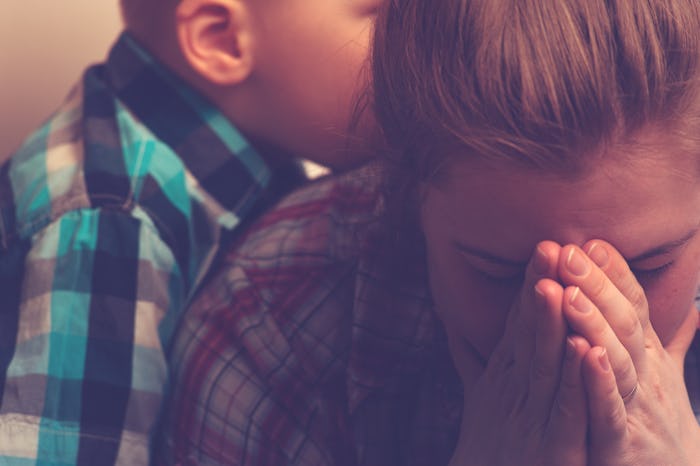Life
Effects Of Postpartum Depression Can Last Until Grandparenthood, Study Finds, But Don't Panic
Any mother who has struggled with postpartum depression knows how crippling it can be. That feeling of utter disassociation, melancholy, the lack of sleep, the deep, dark sadness. It can be horribly isolating, not just for the mother who is trying to cope with all of these feelings, but for the children as well. And those effects might last even longer than some might have hoped; according to a new study, the long-term effects of postpartum depression can last until grandparenthood. Which is just one more reason to develop preventative measures for PPD.
The study, which was published earlier this month in the open-access journal Peer J, looked at the possible long-term effects of postpartum depression on the relationship between her mother and her child. The authors of the study out of the University of Kent in the United Kingdom noted that the bond between a mother and her child is of an "interest from an evolutionary perspective as it plays a role in the accrual of offspring embodied capital, thus affecting offspring quality and offspring’s capacity to subsequently invest in their own children."
With that in mind, post-menopausal women were recruited via social media and marketing campaigns to fill out an anonymous questionnaire detailing each birth they experienced in chronological order. The women were asked to self-report any experiences with postpartum depression, but since this issue remains widely under-reported the authors of the study used two other supplemental screening measures as well.
The questionnaire used a rating system to measure the reported quality of the relationship between mother and child. Mothers were asked to answer "yes" or "no" to a series of questions about their parenting choices, and researchers then keyed in factors like stress, mother's age at birth, and the level of support they specifically felt they had received from their own mothers. After pulling all of the data together, the researchers found that not only does postpartum depression cause long-term damage to a parent's relationship with their child, it appears to have a multi-generational ripple effect.
"Grandmother-grandchild relationship quality will be lower when the grandchildren come from a child whose birth was associated with PND (postnatal depression)," the authors found, according to the study.
Pospartum depression caused a reduced closeness between mother and child which trickled down to the next generation, according to the study authors' conclusion in Peer J:
That (PPD) has long-term detrimental consequences for mother-child relationships, well beyond adolescence, highlights the need for investment in strategies to prevent (PPD) and its cascade of negative multi-generational effects. Investment in (PPD) preventative measures may not only improve relationships between mothers and their children in the short-term, but will also improve family relationships, closeness, and support well into the future.
Now all of this might sound incredibly dire, but don't panic. It's important to recognize the symptoms of postpartum depression and seek out treatment before it begins to affect your family. You should speak to your health care professional if you've had a baby within the past year and are suffering from:
- Feelings of extreme anger
- Crying more often than you might normally do
- Feeling removed, withdrawn, or unable to fully connect with loved ones
- Feeling disconnected or "numb" around your baby
- Guilt feelings that you're not being a good mother
- Worry that you might hurt your baby.
It's also important to note that some women might be at a higher risk of postpartum depression than others. Women who don't have adequate social support, have a family or personal history of depression, teen moms or those who give birth preterm. Mothers of multiples are also at a greater risk for postpartum depression, according to CNN, as are women whose babies are ill, those who struggled to get pregnant, and mothers who had difficult pregnancies.
Staying mindful of your own feelings and reaching out for help are the two most important things you can do to avoid being mired down by PPD. And now that we know how long the effects of PPD can last, it seems more important than ever to help prevent it.
Check out Romper's new video series, Bearing The Motherload, where disagreeing parents from different sides of an issue sit down with a mediator and talk about how to support (and not judge) each other’s parenting perspectives. New episodes air Mondays on Facebook.
